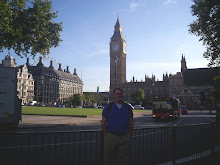Mullin is the Labour MP for Sunderland South and served as junior minister during the middle years of the Blair government. The diary covers the years between 1999 and 2005. During this time, Mullin served as junior minister in the Department of Enviroment, Transport and Regions; where he served under Deputy Prime Minister John Prescott. Mullin then moved over to the Department of International Development. After the general election of 2001, Mullin moves to the backbenches and chairs the Home Affairs Select Committee. Mullin then concludes his career in the foothills by serving in the Foriegn Office as Minster to Africa before being shuffled to the backbenches after the 2005 general election.
Mullin is clearly less than enthused about his initial foray into ministerial life and he approaches his job with a wry skepticism. During his stint under John Prescott, Mullin apparently feels that many of his assignments are no win affairs that are subject to forces greater then he possess. Mullin's attempts to focus on the few initiatives he cares about, and he feels he can address, causes him no little amount of grief with the civil servants who seem to want more from a junior minister. Mullin's look at Whitehall from the bottom of the ministerial ladder is equal parts bemusing and exasperating. Much of the first part of the book, for example, deals with Mullin's conflict with the government agency that provides car to governmental officials. The car agency wants him to ride in a government car everywhere he goes but Mullin would prefer to walk or take a bus if he is just traveling a short distance.
Mullin's later stops are much more positive experiences. He enjoys working at the Department for International Development and thinks it is one of the best departments in all of Whitehall but there is not enough work for a cabinet minister and a junior minister. Mullin enjoys a brief return to the backbenches. He resumes his committee work(where he works alongside future Tory leader David Cameron) and enjoys the freedom that comes with being a member of parliament with no governmental obligations. He feels free to focus on issues he wants to focus on and that he feels like he can contribute something to. During his time on the backbenches, Parliament votes on the war in Iraq. Mullin votes no because there is not a second UN resolution. However, the section on the Iraq war does give a view into the pressures facing MPs during this period.
The last stop on Mullin's trip through Whitehall is the Foreign Office where he serves as the Minister for Africa. he enjoys the work and actually does a little bit of good in negotiations between Ethiopia and Eritrea. However, Mullin never loses the fact that he is a bit player in these affairs and that he possess little power to do more then nudge events a little way forward.
Mullin's book is a diary and the usual caveats about this being one person's view apply. However, the real value and joy in this book comes from the fact that Mullin's view is that of a partial insider. He does not have the complete view but he can catch glimpses of what is going on above him. At the same time, Mullin is sufficiently rooted enough to not get carried away by these glimpses of what he calls the "Olympian Heights" and he is often cognizant of the fact that he was often not much more then a minister in the "Department for Folding Deck Chairs."
The real juicy bits are Mullin's observations of New Labour in the middle of it period in government. Mullin maintains a high regard Tony Blair("The Man") but does not care much for the New Labour movement that brought Blair to power. Other major players do not come off so well. John Prescott has a lot of good qualities but reading Mullin I get the sense that none of those qualities were enough to run the Department of Enviroment, Transport and the Regions. Mullin are goes into some lengths on the tension between the supporters of Blair and Chancellor of the Exchequer Gordon Brown. These tensions are reported second hand but they give the narrative a lot of its external tension. David Cameron and William Hague both have cameo roles, and both(especially Cameron) earn Mullin's respect. President George Bush also makes a few appearances and if the book has a villain it is President Bush who Mullin calls "an intellectually and morally deficient serial killer."
This book might be the most accurate 1st person account of the Blair years. Mullin was high enough to catch glimpses of what went on when Labour was at the peak of its power but he is sufficiently low enough that Mullin does not have an agenda to pursue or scores to settle. This relatively straight view of the Blair government, when combined with Mullin's gift at documenting petty absurdities, make this book a real treasure to read.

No comments:
Post a Comment